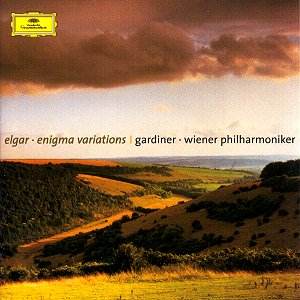This high-profile DG release has had a fairly muted
critical response so far. I certainly looked forward to the disc with
keen anticipation; one of the world’s top orchestras in (for them) new
repertoire, guided by a ‘revisionist’ conductor with a track record
in dusting down the familiar and making us sit up and listen afresh.
The results, alas, are a mixed bag.
The disc gets off to a rousing enough start, the VPO’s
famed string section tearing into In the South with great gusto
and panache. But one has the feeling, as in Solti’s Decca recording
with the London Philharmonic, that Gardiner is aware of Elgar’s own
famous version on EMI. By this stage in his career, Elgar was beginning
to play down the work’s obvious Straussian echoes (he had referred to
Strauss in 1905 as ‘the greatest genius of our days’) and Gardiner similarly
seems to want to play things ‘straight’. So when the great ‘nobilmente’
descending theme emerges, there is little of the passion and sweep that
the music needs. Anyone knowing the version I was brought up on, Silvestri
and the Bournemouth Symphony Orchestra, will know what I mean. A good
modern counterpart to that version is Gibson’s Chandos account, a demonstration
quality recording, with the (then) Scottish National Orchestra on cracking
form. I can safely say the SNO are not outplayed by the Viennese, and
the gorgeous ‘canto popolare’ section is easily as seductive as this
new version. To be sure, there are incidental beauties along the way
(I like Gardiner’s shaping of the ‘Roman’ episode), but too much of
the thrill this wonderful score seems underplayed.
The final coda is a good example; Gardiner, even more
so than Solti, is determined not to ‘milk’ those great brass triplets
at the end and risk any cheap ‘playing to the gallery’; however, in
Gibson’s hands, the slightest broadening out of this passage gives an
overwhelming impact and jubilant finality to the piece.
The Introduction and Allegro gets a reading
of great polish and refinement, and it is only when one turns to famous
rivals (such as Barbirolli) that one realises a dimension is missing;
maybe sheer passion is the vital element, but more than once
I felt a lack of engagement with the music. The central fugue is masterfully
played, and I have never heard the final pizzicato so together.
Still, I’m willing to trade a bit of refinement for some emotional thrust.
Sospiri is almost entirely successful, the weight
and sonority of the Vienna strings giving the piece an almost Brucknerian
intensity. Good as the Hickox version is (one of the fill-ups to his
Chandos recording of The Kingdom), this definitely has the edge.
Any lover of Elgar is bound to have more than one Enigma
in their collection, and it’s doubtful if Gardiner’s will supplant their
current favourite, be it Boult, Barbirolli, Rattle, Solti or, in my
case, Monteux’s 1961 account with the LSO, now on Decca’s ‘Classic Sound’
series. Again, it’s difficult to pin down, as everything is all in the
right place and beautifully executed. But one of the reasons I love
the Monteux so much is his refusal to see Nimrod as the climax,
rightly building a cumulative tension that is only resolved with E.D.U,
the portrait of the composer himself, and surely the work’s true climactic
point. Gardiner tends (at least to my ears) to view the piece too episodically,
superbly played as it all is. It may just be a case of over-familiarity
with one’s favourites, but I did not feel this new recording gave me
any new insights.
The recorded sound is good, though not as spectacular
as the Gibson, or for that matter any better balanced than the old Monteux.
Anyone coming new to this music, and fancying this particular combination,
is unlikely to disappointed. But Elgarians are probably not going to
find old allegiances altered, and it’s worth remembering that most of
the discs referred to above (and many more besides) are either mid or
budget.-priced.
Tony Haywood


